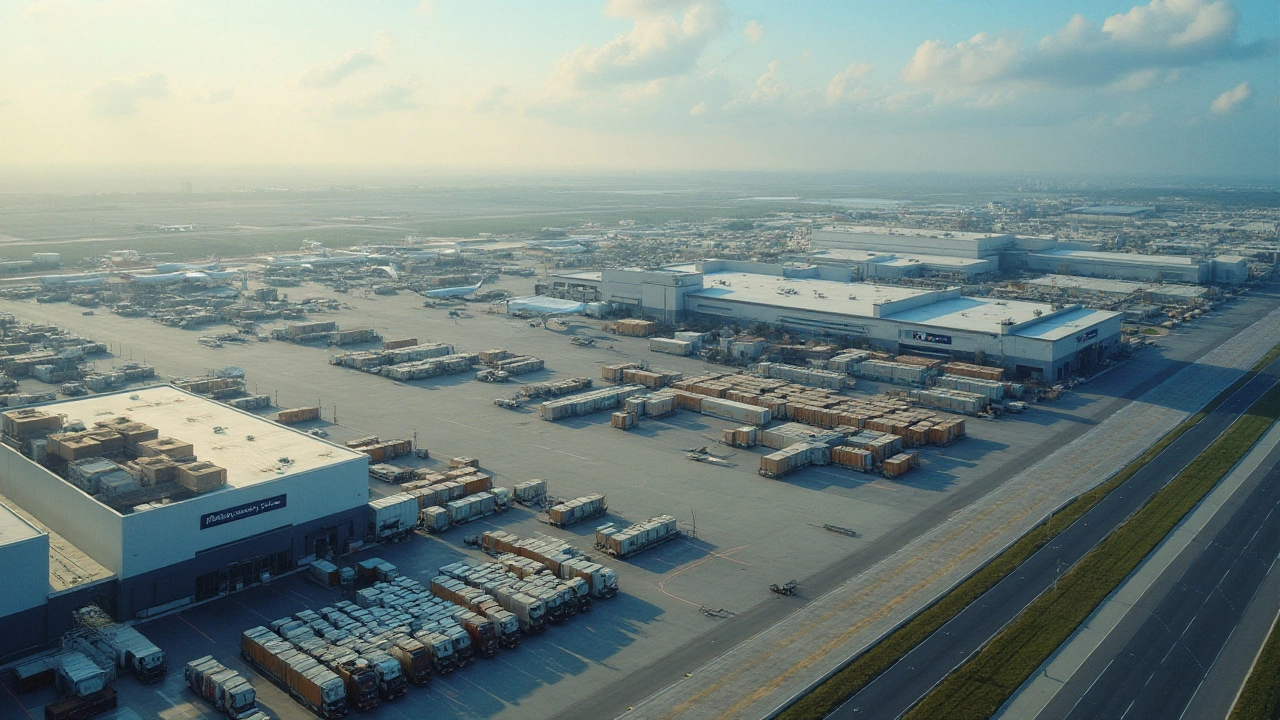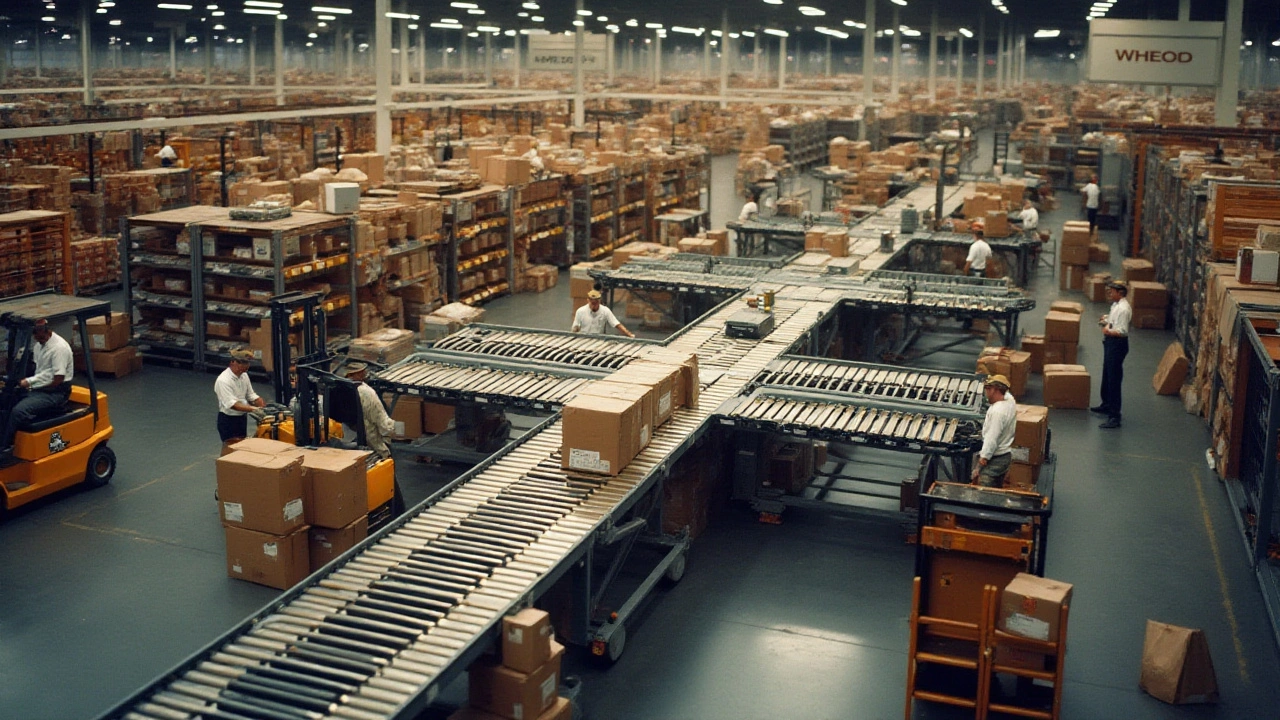When discussing logistics, FedEx often springs to mind as a key player in the field. It’s more than just the familiar trucks and drop-off points; FedEx has woven into the very fabric of global distribution. But what does it truly mean to be a logistics company, and how does FedEx fit into this landscape?
The concept of logistics goes far beyond moving goods from Point A to Point B. It encompasses the entire process of planning, implementing, and controlling the efficiency of this movement to meet customer requirements. FedEx, with its extensive history and expansive service offerings, has made significant strides in redefining what logistics means in today's fast-paced world.
- Understanding Logistics
- FedEx's History and Growth
- Services Offered by FedEx
- FedEx's Role in Global Trade
- Future Trends and FedEx's Adaptations
Understanding Logistics
To begin with, logistics is an intricate dance involving the movement of goods, services, and information from the production point to the consumer stage. It’s not just about transportation; it’s about the entire process that entails storage, inventory, packaging, security, and monitoring the flow of goods. An effective logistics system ensures that the supply chain runs smoothly, enabling companies to meet their customers' demands efficiently. Global trade, fueled by a robust logistics network, has made the world smaller, connecting businesses across continents in an unprecedented manner.
Logistics is a backbone for the modern economy, keeping businesses agile in the market. It involves tactical planning and real-time decision-making. For instance, a slight disruption in the supply chain can lead to shortage or surplus, affecting the business's bottom line significantly. Companies rely heavily on logistics to maintain the rhythm of supply and demand, which, in turn, supports a consistent economic environment. Efficient logistics turn potential disruptions into new opportunities for innovation and improvement. In this world of instant gratification, the ability to deliver goods quickly can define a business's success or failure.
One of the most common misconceptions about logistics is that it solely refers to moving physical items. However, it also involves the transfer of services and information. Logistics includes managing how resources are acquired, stored, and transported to their final destination. The term has its roots in the military, originally referring to the transport and supplies for troops and equipment. This historical origin still echoes today, as logistics programs are used globally to optimize production flows to achieve smooth and efficient operations. Major corporations like Amazon, UPS, and FedEx have turned logistics into a fine art, often treated as a secret weapon in business strategy.
In today's digital era, technology plays a pivotal role in logistics. Tools like GPS tracking, automated warehouses, and predictive analytics have revolutionized how logistics are managed. These technologies provide real-time data that help in planning and execution, reducing the risk of delays, and enhancing customer satisfaction. Blockchain technology has also begun to influence logistics by offering greater transparency and verification within supply chains. Such innovations underline the importance of logistics as an evolving practice, rather than a static component of business.
According to a report by the World Bank, logistics performance is highly correlated with GDP growth, especially in developing countries where improved logistics services can significantly boost economic development.This statement highlights logistics' integral role in economic progress. Developing robust and reliable logistics systems can be pivotal in transforming markets by enhancing trade efficiency and unlocking new opportunities for businesses. As countries increase their investment in infrastructure, software, and education related to logistics, they create more competitive environments for commerce and trade.
FedEx's History and Growth
Founded in 1971 by Frederick W. Smith, FedEx started with a simple but revolutionary idea: creating a dedicated air cargo system to ensure overnight deliveries. The company, initially called Federal Express Corporation, faced many hurdles in its early years, including a near-bankruptcy scenario. In fact, the famous story goes that to keep the company afloat, Smith took its last $5,000 to Las Vegas and won $27,000, just enough to help pay critical fuel bills. From those humble, albeit risky beginnings, FedEx quickly grew during the 1970s, leveraging deregulation in the airline industry and mastering logistic operations, setting it apart from its competitors.
FedEx officially began operations in 1973 with its hub in Memphis, Tennessee. It delivered 186 packages on its first night, serving just 25 cities. Yet, the efficiency of its hub-and-spoke model soon became its signature strength, attracting more businesses seeking reliable overnight service. By the 1980s, the company was on a growth trajectory, expanding both in the U.S. and internationally. This included entering the European market and acquiring companies that strengthened its logistics and delivery network on a global scale.
As FedEx ventured into global territories, it proved its mettle in logistics. The acquisition of major logistics companies like TNT Express further solidified its position in the market. By navigating through regulatory landscapes and adapting to the digital era with initiatives like wireless hand-held systems for tracking shipments in the early 1990s, FedEx showed prowess in innovation.
"Our goal is to not only satisfy our customers but to exceed their expectations every day," Frederick W. Smith has said, a testament to the company's continuous efforts and focus on customer service.
FedEx’s growth is also highlighted by its adaptability in response to changing market conditions. The introduction of e-commerce presented both challenges and opportunities. FedEx embraced this by investing heavily in infrastructure to support the burgeoning demand for online shopping deliveries. Such strategic moves strengthened its role in global logistics. By 2000, it was no mere courier company; it had transformed into a complex logistics leader providing comprehensive supply chain solutions.
Today, FedEx is synonymous with efficient logistics, leveraging its mammoth global infrastructure. The company operates one of the largest air fleets and an expansive ground transportation network, which together deliver millions of packages daily. A testament to its immense growth can be observed in its current operations that span over 220 countries and territories, employing over 600,000 team members worldwide. As it evolves, FedEx continues to embrace new technologies and hands-on strategies to remain a dominant force in the logistics industry.
| Year | Milestone |
|---|---|
| 1971 | Founded by Frederick W. Smith |
| 1973 | Operations began with first deliveries |
| 1984 | Expanded to European markets |
| 2000 | Rebranded as FedEx Corporation |
| 2016 | Acquired TNT Express |

Services Offered by FedEx
FedEx, a recognized leader in logistics, offers an array of services designed to meet the various needs of businesses and individuals worldwide. From local deliveries to intercontinental freight transport, the company's capabilities are diverse and robust. The hallmark of FedEx's offerings has always been its commitment to efficiency and reliability, which is evident in their comprehensive service portfolio.
One of the core services provided by FedEx is international shipping. This forms the backbone of its logistics operation, connecting businesses to markets across the globe. The company’s global network is engineered to handle everything from a simple envelope to large cargo containers, ensuring that goods arrive at their destinations safely and on time. This is supported by an integrated air and ground network that operates 24/7, providing businesses with unparalleled delivery options.
Besides the standard shipping services, FedEx also specializes in freight solutions. Whether it's full-truckload or less-than-truckload shipments, FedEx Freight offers customizable options that cater to different shipping needs and budgets. Their solutions come equipped with tracking capabilities, allowing companies to monitor shipments in real-time, which is crucial for supply chain transparency. FedEx's expertise in freight logistics is a testament to its breadth as a logistics provider.
"FedEx Freight is our silent workhorse, always reliable, adapting to our needs, whether our shipments are big or small," remarks Andrew Davis, a supply chain manager at a multinational corporation.
In addition to shipping and freight, FedEx offers supply chain solutions that help companies streamline their operations. This includes warehousing, distribution, and order fulfilment services designed to enhance efficiency and lower costs. Many businesses leverage FedEx's sophisticated technology and expert personnel to build and maintain a smooth supply chain process. Their extensive experience in logistics means they are well-versed in tackling complex supply chain challenges head-on.
For those looking for more specialized services, FedEx also runs a range of express delivery options. Known for their speed and precision, FedEx Express ensures time-critical deliveries are made promptly, regardless of the distance. Their various express services are equipped to meet tight deadlines, making them a favorite among businesses that require agile and responsive delivery solutions.
The logistics powerhouse does not stop there; they also provide bespoke solutions tailored to the healthcare industry through FedEx HealthCare Solutions. This sector-specific service ensures the secure, compliant, and timely delivery of sensitive medical equipment and pharmaceuticals, further underscoring FedEx's versatility and commitment to excellence in logistics.
FedEx's Role in Global Trade
In the vast, interconnected web of global trade, FedEx stands as a titan, easing the flow of goods across continents efficiently and reliably. Every package sent through its network is part of a larger story—a company dedicated to ensuring that borders are merely lines on a map, not barriers to commerce. An intriguing aspect of FedEx's operations is its ability to consolidate shipments, a method where multiple shipments are combined, streamlining the logistic process and reducing costs. This ability is due to FedEx's vast network which connects more than 220 countries and territories, facilitating commerce on a truly international scale.
One significant way FedEx impacts global trade is through its advanced technology. The company has invested heavily in digital infrastructure to track shipments, give customers real-time updates, and optimize delivery routes. This tech prowess means that businesses, big or small, can trust FedEx to handle logistics with precision.
"The infrastructure FedEx has built plays a crucial role in ensuring global supply chains remain functional and resilient," said a logistics expert from the World Trade Organization.Their fleet, which includes aircraft and ground vehicles, is another feather in FedEx's cap, designed to move not just packages but economies by enabling timely deliveries and simplifying customs processes.
FedEx's influence on trade isn’t just through moving goods; it's about creating opportunities. Many businesses, especially those aiming to scale, find that ensuring their products can reach international markets is a significant challenge. Here, FedEx offers solutions that handle not only transportation but also warehousing and distribution, essentially integrating into the supply chains of the companies they serve. They go above and beyond by understanding the specific rules and regulations of international shipping, allowing companies to focus on what they do best. By doing so, FedEx doesn’t only support companies but also fosters global economic integration which is essential in today’s fast-paced market.
The role FedEx plays is amplified during peak seasons, where the company demonstrates its logistical might. Hits like Black Friday and Cyber Monday see a surge in demand, and FedEx has the systems in place to handle the increased volume efficiently. They prepare in advance, employing technology to predict surges and adjust capacity accordingly. Take for instance the new automated sorting facilities that are capable of processing thousands of packages per hour. This efficiency ensures businesses meet customer expectations and maintain high service standards, which is crucial in competitive markets.
Notably, FedEx is also committed to sustainability, acknowledging the environmental impact logistics can have. Through initiatives aimed at reducing carbon emissions and developing alternative fuel vehicles, FedEx leads by example. They're not just in the business of shipping; they're in the business of shaping a future where commerce doesn't come at the expense of our planet. Their role in global trade thus extends beyond mere transportation to affecting positive changes in environmental policy and practices within the industry. Understanding this, FedEx’s contribution to global trade is not just about moving parcels but is also about moving towards a more interconnected and responsible world.

Future Trends and FedEx's Adaptations
Looking ahead in the world of logistics, changes are not only anticipated but expected. The landscape is shifting drastically with technological advancements and the demands of e-commerce. FedEx, aware of these transformations, is not just reacting but strategizing for the future. One major area of focus is automation. With the rise of e-commerce and the expectation of fast deliveries, the need for efficiency is paramount. FedEx has been investing heavily in robotic Process Automation (RPA) to streamline operations, minimize errors, and speed up logistic processes.
Digital infrastructure is becoming increasingly crucial. FedEx has embraced digital tools to enhance real-time tracking and transparency for its customers. Customer expectations now include being able to see where their package is at any point from dispatch to delivery. FedEx is addressing this with better technologies in their logistics chain. It's not just about keeping pace with technological shifts; it’s about using them to gain a competitive edge.
Environmental sustainability is another trend influencing FedEx's strategies. With mounting pressure on all sectors to reduce carbon footprints, FedEx aims to achieve carbon-neutral operations by 2040. The company is not only integrating electric vehicles into their fleet but also enhancing their air operations with more efficient aircraft.
The former CEO, Fred Smith, once remarked, "Our goal is to electrify the fleet and be the leaders in sustainable logistics."
The global supply chain woes of recent times have underscored the need for resilient logistics frameworks. FedEx is investing in solutions that bolster supply chain resilience, including diversifying sourcing and improving predictive analytics through AI to better handle disruptions. As they stare into the future, partnerships, and collaborations are on the cards to expand their technological capabilities and meet customer needs comprehensively.
Of note is FedEx's venture into the deployment of drones for last-mile delivery. Although still in nascent stages, drone technology can significantly reduce delivery times in urban areas. FedEx's early experimentation positions them as a frontrunner in deploying innovative delivery solutions. Their vision is aligned with creating a more seamless and interconnected world of delivery solutions, adapting to the dramatic shifts in consumer behavior.
As these trends signal a new era for logistics, FedEx is not just a part of these changes but is often at the forefront of driving them. Through innovation and adaptability, FedEx is crafting a blueprint that many other logistics firms are likely to emulate in the future.


